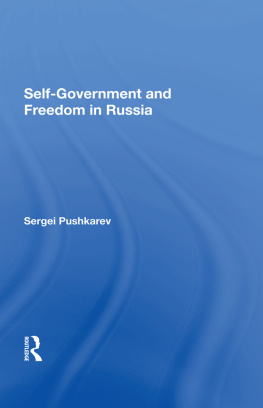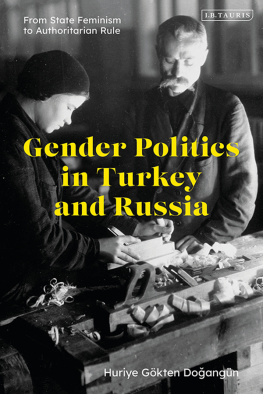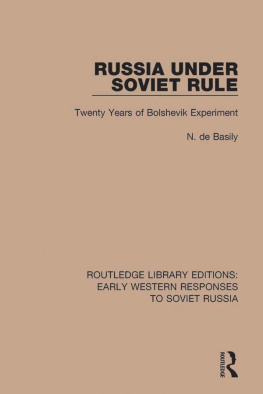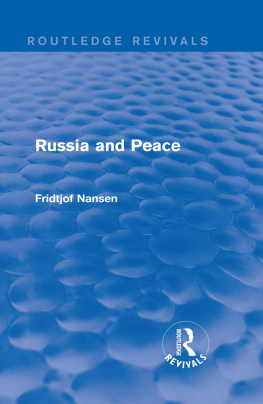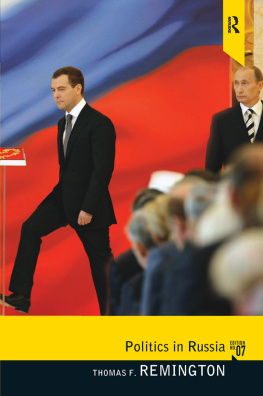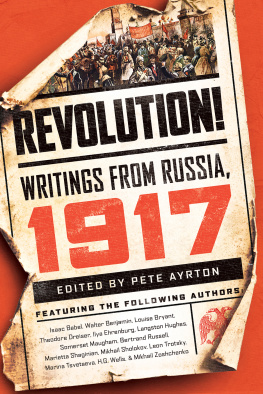ROUTLEDGE LIBRARY EDITIONS: EARLY WESTERN RESPONSES TO SOVIET RUSSIA
Volume 4
RUSSIA TO-DAY
RUSSIA TO-DAY
What Can We Learn From It?
SHERWOOD EDDY
First published in Great Britain in 1934 by George Allen & Unwin Ltd
This edition first published in 2018
by Routledge
2 Park Square, Milton Park, Abingdon, Oxon OX14 4RN
and by Routledge
711 Third Avenue, New York, NY 10017
Routledge is an imprint of the Taylor & Francis Group, an informa business
1934 Sherwood Eddy
All rights reserved. No part of this book may be reprinted or reproduced or utilised in any form or by any electronic, mechanical, or other means, now known or hereafter invented, including photocopying and recording, or in any information storage or retrieval system, without permission in writing from the publishers.
Trademark notice: Product or corporate names may be trademarks or registered trademarks, and are used only for identification and explanation without intent to infringe.
British Library Cataloguing in Publication Data
A catalogue record for this book is available from the British Library
ISBN: 978-1-138-04993-2 (Set)
ISBN: 978-1-315-11072-1 (Set) (ebk)
ISBN: 978-1-138-07107-0 (Volume 4) (hbk)
ISBN: 978-1-315-11480-4 (Volume 4) (ebk)
Publishers Note
The publisher has gone to great lengths to ensure the quality of this reprint but points out that some imperfections in the original copies may be apparent.
Disclaimer
The publisher has made every effort to trace copyright holders and would welcome correspondence from those they have been unable to trace.
RUSSIA TO-DAY
What Can We Learn From It?
by
SHERWOOD EDDY
LONDON
GEORGE ALLEN & UNWIN LTD
MUSEUM STREET
COPYRIGHT IN THE U.S.A. 1934
FIRST PUBLISHED IN GREAT BRITAIN I934
All rights reserved
CONTENTS
PART I
THE WARNING OF RUSSIAS EVILS
CHAPTER
PART II
POSSIBLE CONTRIBUTIONS TO HUMAN WELFARE
During the past summer I was asked to deliver the sixth in the series of the Merttens Lectures in England upon the subject chosen by the Committee, The Russian Experiment: What Can We Learn From It? It may be somewhat galling for the Anglo-Saxon to admit that he has anything to learn from such a source. Soviet Russia, on the one hand, striving desperately to make good in her self-appointed task, is still in the midst of her great experiment. We, on the other hand, hope that we are nearing the end of the great world depression. That depression, like the World War before it, has revealed seams of weakness in our economic and social order which we are seeking to understand and to correct.
We need not look to Soviet Russia as a model or perfect example in anything. We ourselves are consciously far from perfect. But we may learn from a competitor, or even from an enemy in war time, as we did during the last World War. It would have been absurd for the Allies at the beginning of the World War to say that they had nothing to learn from the Germans, when their ships were being sunk at an alarming rate, and their armies driven back in the trenches by superior artillery. The situation could not be met by mere propaganda against German atrocities. They had to change their methods and to do it in time. This is not to suggest that Soviet Russia is an enemy comparable to Germany in war time, but we should take a view as realistic as the Russians of the class war which they believe is already a reality. We may learn much from another country, whether by way of warning or of suggestion, from its failures as well as from its successes. We surely have much to learn from both in the case of the Soviet Union.
I have just returned from my tenth visit to Russia. As my work leads me to cross Europe each year I shuttle back and forth between these two contrasted systems of individualism and collectivism, of capitalism and communism. Russia is almost as unlike the rest of the world as the planet Mars must be. Despite its glaring evils and manifest shortcomings it is the most amazing, the most disturbing, yet in some respects the most fascinating country in the world.
In the western world we have been cursed with unemployment and overproductionsome thirty millions having been left without work during long periods of the depression, unable to buy the goods which they themselves have produced. In Soviet Russia there is no unemployment but most serious under-production. They will not be able for years if not decades to come to overtake the demand for home consumption in this colossal Republic with its population of over 165,000,000, which stretches for almost six thousand miles over nearly one-sixth of the habitable globe. The growing demands of its population for a rising standard of living are increasing even more rapidly than its numerical strength which is adding ten thousand a day to its numbers, or about as many as all the rest of Europe combined. Here is the largest country in the world, with vast undeveloped resources, trying the boldest experiment in history. Here on a huge scale they are trying to build a new world, a new humanity. For the first time in history a whole section of mankind is being suddenly and radically changed in conformity to a new ideal, with the attempt to create a new environment, a new psychology, a new economic, political and social order, reconstructed from its very foundations. Russia is a land of limitless contradictions whose high ideal ends are often defeated or postponed by its ruthless use of means.
My latest visit to Russia confirmed and deepened my conviction regarding the four chief evils of the Soviet system, the last three of which are so serious, so enduring and so of the very essence of Communism itself that they would make it quite impossible for me ever to accept it. These evils are a paralyzing and ineffective bureaucracy, the essential denial of liberty, the danger of violence and compulsion especially in a seemingly interminable continuing revolution, and finally a narrow and exclusive dogmatic basis, as illustrated by the dogmatic atheism and anti-religious zeal required of every orthodox Communist or Party member. These evils are described in Part I of the present volume. They are, however, more briefly treated because I have already covered them in my previous book,


